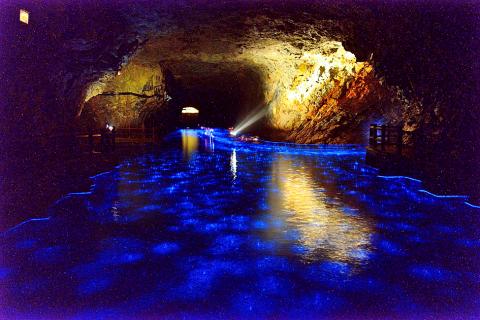In the past three years about 30 visitors to Beihai Tunnel (北海坑道) in Matsu’s Nangan Island (南竿) have lost cellphones while photographing the famed “blue tears,” a county official said.
The blue tears are a naturally occurring phenomenon caused by a form of algae called Noctiluca scintillans, which glows a bright-blue color from April through August every year. The blue tears are a major tourist attraction, drawing 180,000 visitors to Lienchiang County last year.
The Beihai Tunnel, which provides an ideal place to view the algae, is one of three such tunnels in Matsu built from 1969 to 1971 by the Ministry of National Defense to provide protection for military vessels. The tunnel was remodeled and opened to the public in 2000 under orders from then-Lienchiang County commissioner Liu Li-chun (劉立群), who hoped the tunnel would boost tourism. It remains the only one of the three tunnels accessible to the public.

Photo provided by the Lienchiang County Government
Lighting inside the tunnel is kept off when visitors enter at night so that the only light comes from the glowing algae, which become visible when the water is disturbed by paddles or oars.
Tourism officials said the effect is like “floating through space surrounded by the light of the stars.”
Lienchiang County Transportation and Tourism Department Deputy Director Liu Hsing-chien (劉性謙) said the water in the tunnel is 6m deep at its most shallow point.
“If someone drops a cellphone in that water it is quite hard to retrieve it,” he said.
One boat operator recalled a father who dropped an iPhone 7 in the water recently while photographing the blue tears.
“The smartphone had several pictures of his son. Those memories are all lost,” the operator said.
The most important first step if a handset is recovered from water is to turn the power off and remove the battery if possible, the Liberty Times (the Taipei Times’ sister newspaper) digital lifestly editor Chuang Ying-chun (莊英群) said, adding that the smartphone should then be placed in front of a fan to dry for at least one day.
Tourists who drop their handsets in the water while aboard a boat cannot seek compensation from operators except in the event that the boat is being operated incorrectly, lawyer Lin Fu-kuei (林富貴) said.

A preclearance service to facilitate entry for people traveling to select airports in Japan would be available from Thursday next week to Feb. 25 at Taiwan Taoyuan International Airport, Taoyuan International Airport Corp (TIAC) said on Tuesday. The service was first made available to Taiwanese travelers throughout the winter vacation of 2024 and during the Lunar New Year holiday. In addition to flights to the Japanese cities of Hakodate, Asahikawa, Akita, Sendai, Niigata, Okayama, Takamatsu, Kumamoto and Kagoshima, the service would be available to travelers to Kobe and Oita. The service can be accessed by passengers of 15 flight routes operated by

Alain Robert, known as the "French Spider-Man," praised Alex Honnold as exceptionally well-prepared after the US climber completed a free solo ascent of Taipei 101 yesterday. Robert said Honnold's ascent of the 508m-tall skyscraper in just more than one-and-a-half hours without using safety ropes or equipment was a remarkable achievement. "This is my life," he said in an interview conducted in French, adding that he liked the feeling of being "on the edge of danger." The 63-year-old Frenchman climbed Taipei 101 using ropes in December 2004, taking about four hours to reach the top. On a one-to-10 scale of difficulty, Robert said Taipei 101

Taiwanese and US defense groups are collaborating to introduce deployable, semi-autonomous manufacturing systems for drones and components in a boost to the nation’s supply chain resilience. Taiwan’s G-Tech Optroelectronics Corp subsidiary GTOC and the US’ Aerkomm Inc on Friday announced an agreement with fellow US-based Firestorm Lab to adopt the latter’s xCell, a technology featuring 3D printers fitted in 6.1m container units. The systems enable aerial platforms and parts to be produced in high volumes from dispersed nodes capable of rapid redeployment, to minimize the risk of enemy strikes and to meet field requirements, they said. Firestorm chief technology officer Ian Muceus said

MORE FALL: An investigation into one of Xi’s key cronies, part of a broader ‘anti-corruption’ drive, indicates that he might have a deep distrust in the military, an expert said China’s latest military purge underscores systemic risks in its shift from collective leadership to sole rule under Chinese President Xi Jinping (習近平), and could disrupt its chain of command and military capabilities, a national security official said yesterday. If decisionmaking within the Chinese Communist Party has become “irrational” under one-man rule, the Taiwan Strait and the regional situation must be approached with extreme caution, given unforeseen risks, they added. The anonymous official made the remarks as China’s Central Military Commission Vice Chairman Zhang Youxia (張又俠) and Joint Staff Department Chief of Staff Liu Zhenli (劉振立) were reportedly being investigated for suspected “serious